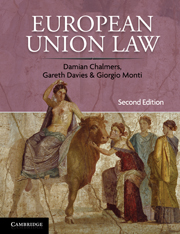Book contents
- Frontmatter
- Contents
- Map
- Preface
- Abbreviations
- Table of Cases
- Table of Treaties, Instruments and Legislation
- Table of Equivalents
- Electronic Working Paper Series
- 1 European Integration and the Treaty on European Union
- 2 The EU Institutions
- 3 Union Law-making
- 4 The EU Judicial Order
- 5 The Authority of EU Law
- 6 Fundamental Rights
- 7 Rights and Remedies in National Courts
- 8 Infringement Proceedings
- 9 Governance
- 10 Judicial Review
- 11 EU citizenship
- 12 EU Law and Non-EU Nationals
- 13 Equal Opportunities Law and Policy
- 14 EU Criminal Law
- 15 External Relations
- 16 The Internal Market
- 17 Economic and Monetary Union
- 18 The Free Movement of Goods
- 19 The Free Movement of Services
- 20 The Pursuit of an Occupation in Another Member State
- 21 Trade Restrictions and Public Goods
- 22 EU Competition Law: Function and Enforcement
- 23 Antitrust and Monopolies
- 24 State Regulation and EU Competition Law
- Index
3 - Union Law-making
- Frontmatter
- Contents
- Map
- Preface
- Abbreviations
- Table of Cases
- Table of Treaties, Instruments and Legislation
- Table of Equivalents
- Electronic Working Paper Series
- 1 European Integration and the Treaty on European Union
- 2 The EU Institutions
- 3 Union Law-making
- 4 The EU Judicial Order
- 5 The Authority of EU Law
- 6 Fundamental Rights
- 7 Rights and Remedies in National Courts
- 8 Infringement Proceedings
- 9 Governance
- 10 Judicial Review
- 11 EU citizenship
- 12 EU Law and Non-EU Nationals
- 13 Equal Opportunities Law and Policy
- 14 EU Criminal Law
- 15 External Relations
- 16 The Internal Market
- 17 Economic and Monetary Union
- 18 The Free Movement of Goods
- 19 The Free Movement of Services
- 20 The Pursuit of an Occupation in Another Member State
- 21 Trade Restrictions and Public Goods
- 22 EU Competition Law: Function and Enforcement
- 23 Antitrust and Monopolies
- 24 State Regulation and EU Competition Law
- Index
Summary
INTRODUCTION
This chapter considers the different forms of law and regulatory acts in EU law, the legislative and regulatory procedures deployed to enact them and the debate about the democratic legitimacy of the European Union. It is organised as follows.
Section 2 looks at the allocation of legislative or regulatory authority in EU law. A legal base for each field of EU law sets out the legislative procedure and legal or regulatory instruments that may be adopted in that field. In cases of contestation reference will be had to the predominant aim and content of the measure to determine the base. If the measure is inextricably and equally associated with more than one base the Court of Justice will then apply a formal hierarchy between legal bases.
Section 3 discusses the types of legislation in EU law. There are four types of binding legislative instrument in EU law: Regulations, Directives, Decisions and international agreements. Two problems to have emerged are that the legislative instruments have been used interchangeably and that there was traditionally no hierarchy between different types of legislative instrument. The latter was addressed by the Lisbon Treaty, which drew a hierarchy between legislative acts (acts adopted under the legislative procedures set out in the Treaty) and non-legislative acts. However, no hierarchy is provided between the different types of non-legislative act: delegated acts and implementing acts.
- Type
- Chapter
- Information
- European Union LawCases and Materials, pp. 92 - 141Publisher: Cambridge University PressPrint publication year: 2010
- 1
- Cited by

